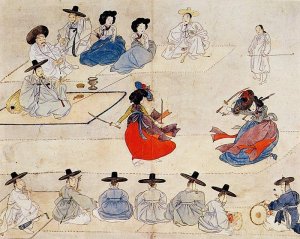
The swift pacing does present some issues though. I know that adapting a well-loved, lengthy novel to the screen is challenging, but either pruning some of the more esoteric subplots or giving them additional screen time would have made the story easier to follow. It took a good 20 episodes to figure out the major character relationships, and some elements remained hazy up until the end. While I generally don’t advocate for extended flashbacks or childhood sequences, this is one case where showing rather than telling about past events would have been helpful. While I could intellectually understand the characters’ grief and their desire to right past wrongs, it was hard to emotionally engage with people and situations only encountered in the briefest of flashbacks. Like Mei Chang-su, the show is precise, intelligent and lovely. It’s also a bit cold. I would have liked more fire in the midst of all the snow.
Cet avis était-il utile?

Cet avis était-il utile?

Cet avis était-il utile?

W - Two Worlds Apart
43 personnes ont trouvé cette critique utile
What starts as an engaging meditation on how artistic works can take on a life of their own devolves into a jumble of incomprehensible rules and mangled timelines. The bigger thematic ideas get lost as you sense the actual writer struggling every bit as much as her cartoonist antihero to give her work an ending. And unfortunately, just like him, she can’t seal the deal. In a world where everyone can magically draw (or write) themselves out of difficulty, the act of creation gets reduced to expediency, not art. The fans within the show know something’s gone awry, but, alas, the fans in the “real”, real world are left hanging too. As a metaphor for how stories slip away from their authors, this one turns out to be a bit too apt.
Cet avis était-il utile?

Rebel: Thief Who Stole the People
21 personnes ont trouvé cette critique utile
The plot mechanics, on the other hand, are less effective. There are tons of intriguing set-ups that never pay off in meaningful ways, and the story takes an awfully long time to build to anything approaching actual rebellion. It also introduces a supernatural element that’s too literal to be read as symbolic but too underdeveloped to serve as a unifying mythology. It ends up feeling like a distraction from the very real issues that the characters confront – an easy way to get the characters out of trouble (hey look, super powers!) without serving any broader thematic purpose. In the end, the show is solid, but I wish its dramatic revelations were as engaging as its revolutionary ideas.
Cet avis était-il utile?

Thematically, there are some interesting ideas thrown around about slavery, class, progress and authority but the writer seems unsure of exactly what he wants to say about them. The show is built around the awfulness of slavery, but it also depicts most of its slave characters as gullible fools, reinforcing the negative stereotypes stamped on them by the powerful. Folks respond to injustice with violence and/or flight, but neither tactic really seems to get anyone anywhere. There is a lot of stunning footage of running and fighting, but little clear sense of how the audience should feel about these choices. Are we supposed to applaud them? Reject them? Realize that the situation is a hopeless mess? And what is a viewer supposed to conclude from the fact that when change does happen, it results from factors almost totally removed from the actions of the central characters?
Good acting and striking visuals keep Chuno entertaining, but the narrative muddle weighs it down. There are some powerful moments, but the script never matches the dangerous, high-flying verve of its knife-wielding leading man.
Cet avis était-il utile?
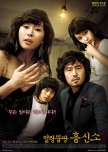
Evasive Inquiry Agency
14 personnes ont trouvé cette critique utile
Off-kilter visuals, clever dialogue and ingenious music choices provide plenty of humor (don't miss the little bonus scenes tacked on at the end of each episode), but they’re in the service of serious themes. Without ever becoming overly didactic, the show notes the fragility of life and the importance of embracing the here and now. The protagonists may long for extraordinary riches (in this case, tons of hidden gold), but their everyday interactions are where true value lies. For the viewer, though, the biggest prize is getting to savor this underrated gem of a show. Like all treasures, it may be hard to find, but you’ll be well rewarded if you seek it out.
Cet avis était-il utile?

From a production standpoint, the show is often uneven. This is very much a writers’ show, and at its best, it’s tightly plotted, with thematic depth, complex characters, and powerful payoffs. It’s not perfect - the initial episodes are exposition heavy and awkward, the action lags in places, and the set-up presents a giant structural challenge that the writers are never able to fully overcome. The directing is functional, but not particularly distinguished. It’s also a show that is far more fortunate in the casting of its antagonists than of its protagonists. On the plus side, Go Hyun Jung and Kim Nam Gil are fabulous, and their performances alone are worth the 62 hour investment in the show. On the down side, this skews the dramatic structure and emotional impact of the story in ways that become particularly problematic towards the end.
Issues aside though, this remains a powerful show, one that for all the political games, epic battles, and over-dramatic close-ups keeps returning to three abandoned children and the cost of breaking human bonds. And how often do dramas of any type provide both a strong, smart female protagonist and a strong,smart female antagonist (and surround them with gorgeous guys)?
Cet avis était-il utile?
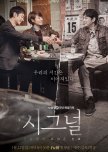
On the plus side, the show's fast pacing tends to paper over the plot holes, but it shortchanges the development of most of the secondary characters. They become “innocent victims” or “evil elites” we’re supposed to mourn or hate simply because of the suffering they endure or inflict on others. Occasionally there are glimpses of greater depth before the show bustles viewers off to the next crime scene, but I would have appreciated fewer set ups and more follow through. The concept is intriguing, but once you unwrap the layers of snazzy time warp packaging you’re left with a pretty ordinary procedural. The present may be able to change the past and vice versa, but the conventions of the crime drama survive unscathed.
Cet avis était-il utile?

On the downside, I do wish the antagonists in the show were as multi-dimensional as the protagonists. The shadowy gang of leering oligarchs plotting EEEEVIL in back rooms felt preordered from central casting, with master plans that were too over-the-top to be really believable. I kept expecting them to start stroking Persian cats or feeding their piranhas. If you’re watching for the action thriller/romance elements, you probably won’t mind, but their cartoonish-ness undermines the credibility of the crusading journalists out to take down corruption strand of the story. It doesn’t diminish the fun, but it does make the show less socially relevant than it would like to be. There is also an odd casualness in the way that all of the characters, both good and bad, roam in and out of each others' lives and lairs with impunity. I guess courage is virtue, but I’m not sure I’d curl up and take a nap in the heart of enemy territory.
This is a show though where the emotional through-lines not the plot mechanics are the real draw, and those deliver with a vengeance. You’ll laugh and cry and smile and fall in love. In an entertainment world full of lots of explosions but few real sparks, that's reason to rejoice.
Cet avis était-il utile?
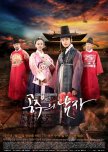
Alas, for all the lovely visuals and promising set-ups, the screenplay soon runs into issues. Few things frustrate me more than when characters act in ways that are convenient for the writer but fly in the face of common sense. Once the bloodshed begins, the characters appear to lose brain cells along with hemoglobin, making stupid choices that often seem directly at odds with their stated goals. If you’re looking for carefully crafted revenge schemes, you’ve come to the wrong show. Complex characters and decisions get dumbed down, and “Daddy doesn’t like my boyfriend” is treated as a crisis equivalent to “Dozens of innocent people may die today.” I personally found the secondary couple’s story arc much more compelling, if less swooningly romantic, than that of the leads, in large part because it seemed more grounded in the real world.
Finally, I wish the show had been willing to tackle the difficult questions raised by the historical events it draws on. This is a drama that has no place for the inconvenient truth that Suyang, for all his ruthlessness, turned out to be an excellent ruler, or for the idea that the welfare of a nation might matter more than the suffering of the elites. The period offers fertile ground for exploring if and when ends justify means, but the writer ultimately settles for easy heroes and villains. All in all, there’s a lot of flair, but far less substance than I hoped for.
Cet avis était-il utile?
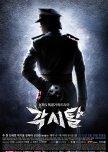
Always. It’s like being trapped in a room with a blind boxer. Windows get broken, messes get made, lots of punches go awry. Between the shouting and the pistol-waving and the torture and the explosions you may want to slip the show a few Valiums and tell it to chill. But then a punch lands, and damn . . .
Is the show often over-the-top? Repetitive? Uneven? Infuriating? Yes. All of the above. But its no-holds-barred approach is also its greatest strength. The show takes big risks, and while not all of them pay off, its willingness to push the boundaries of content and plot conventions makes it gripping and unpredictable. It’s rarely subtle, but when it works it’s powerful. Much of this power comes from the raw energy of its male leads, and their explosive chemistry as they love and hate and destroy each other and those around them. The female lead is weak but it doesn’t really matter. This show is all about the boys.
Is there a lot of sturm und drang? Yes. Is all of it necessary? Maybe not, but the best moments will haunt you long after the screaming stops.
Cet avis était-il utile?

Cet avis était-il utile?

Love Between Fairy and Devil
10 personnes ont trouvé cette critique utile
All the Feels
It seems so simple. Create nuanced characters that don’t slot neatly into standard role types. Give them time to build relationships. Make their choices hard. And yet, it’s rare to see shows do these things, and even rarer when one does them well. And, holy mother of demons and deities, does Love Between Fairy and Devil do them well. It understands that a show about emotions works best if it can make the audience feel every single one of them, and it uses carefully crafted storytelling and skilled directing to ensure just that. Whether it’s a moment of laugh-out-loud humor, sexy skinship, or heartrending grief, this team ensures that it lands, and lands hard. It’s a good old-fashioned melodrama in the best sense – one that recognizes that what we feel is the defining fact of who we are.The show may be a fantasy, but when it comes to matters of the heart, it gives its characters no magic ways to fix things. Love is not instant, trauma lingers, and all loyalties cannot be honored equally. The cast’s skill levels vary, some of the visuals can be alarming, and the female lead makes a strong case for voice dubbing, but the show gets things right when it counts. While it may cop out ever so slightly in the final seconds, it argues that our real power comes not from what we cling to but from what we’re willing to sacrifice, and that while love may not conquer all, no conquest is worth a thing without it.
Cet avis était-il utile?

The manga-esque staginess takes a bit of getting used to, with heavy-handed (literally) physical attacks and cartoonish mugging. The silliness alternates between endearing and alarming, but there is nothing frivolous about the show’s treatment of music. It notes how unforgiving the arts world can be, full of too many gifted students and too few opportunities, how competition, envy, harsh instructors and grueling practice regimens can drain the spark from performers. But, to its credit, the drama never glosses over the discipline needed to do great work. This is a show that celebrates both playfulness and rigor, suggesting that the best art comes not from one or the other but from a happy marriage of the two. It isn’t the misfits vs. the superstars, but an understanding that both are needed to bring a score to life. Moments of true harmony may be fleeting, but when they happen, in either love or music, it’s cause for celebration.
Cet avis était-il utile?

